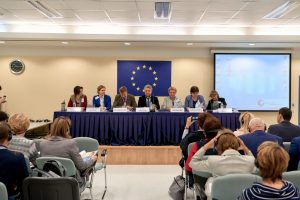
On November 27, 2018, in Moscow in the Headquarters of the European Union in the Russian Federation, a seminar entitled “A New Stage of the Torino Process 2018-2020 in Russia” was held. Among the guests were Tanzilya Nigmatullina, a Coordinator of this project in the Republic of Bashkortostan, head of the UNEVOC center; Olga Khoroshavtseva, deputy director for educational and disciplinary work, and Rakhil Velts, head of the department of humanitarian disciplines and the labor union movement.
The main objectives of the Torino Process are the formation of a policy in the field of vocational education and training; analytical expert assessment of the development of vocational education in the participating countries; assistance in improving vocational education, project support, providing a basis for innovative technologies, best teaching materials, discussing problems within a structured dialogue and developing specific recommendations and a common understanding of the medium-term perspectives in terms of modern vocational education.
The issue of professional education for the socio-economic sphere, primarily in the field of working professions, is one of the most prominent ones for the entire international community. It is not by chance that more than 30 countries of the world, including cities and regions of Russia (Moscow, St. Petersburg, Leningrad oblast’, Orenburg oblast’, the Republic of Mari El, Perm oblast’, and since March 2018 – the Republic of Bashkortostan) have become project participants. The participation of our republic in this project will allow us access to world practices to improve the quality of training of graduates of secondary vocational education and universities; attracting employers and business, introducing national standards for quality, mobility of graduates and, importantly, positioning the Republic of Bashkortostan as a region capable of responding promptly and adequately to the challenges of modern times.
In July this year, a round table was held at our institute, with participants: Franca Crestani, Program Coordinator of the European Training Foundation; Olga Oleynikova, Director of the Center for the Study of Vocational Education Problems, Coordinator of the Torino Process in Russia and representatives of Colleges of the Republic. It was the first major acquaintance with the basic ideas and principles of the Torino process.
The seminar held in Moscow discussed the main features of the Torino Process 2019–2020, as well as its implementation in Russia at the regional level.
Among seminar participants were: Cesare Onestini, Director of the European Training Foundation; Richard Burger, Research and Innovation Advisor, Head of Science and Technology at the European Union Delegation to the Russian Federation; Franca Crestani, Program Coordinator, European Training Foundation; Mihailo Milovanovic, Senior Expert in VET Policy and Systems at the European Training Foundation; Olga Oleynikova, Director of the Center for the Study of Vocational Education Problems, Coordinator of the Torino Process in Russia; Inna Chernoskutova, Director of the Department of State Policy in the Field of Vocational Education and Advanced Training of Personnel of the Ministry of Education of the Russian Federation; N. Shutenko, Advisor to the Rector of the Russian State Social University; E. Yesenina, Senior Research Fellow, Center for Vocational Education and Qualifications Systems of the Federal Institute for Educational Development of the Russian Academy of National Economy and Public Administration under the President of the Russian Federation, as well as representatives of cities and regions participating in the Torino process.
Tanzilya Nigmatullina informed the participants about the development of the vocational education system in the region and the implementation of the main activities in the framework of the Torino process.
The discussion was fruitful: the participants clarified a lot for themselves, received answers to their questions, exchanged experiences and agreed on further cooperation.

 November 28th, 2018
November 28th, 2018  ALINA B.
ALINA B.  Posted in
Posted in